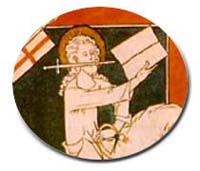 |
Forgotten Truths
It Is Turpitude for a Husband to Love His Wife as the Seducer Loves the Adulteress
When we go to the old translations of the Catechism of Trent, we find a more rigorous language than in the new translations. This is the case of the severity with which that excellent
Catechism exprobates the bad use of marriage.
These words fit perfectly in this series on how the Catholic Church condemns the modern scourges against marriage
Roman Catechism
Two lessons of instruction are, then, to be specially pressed upon the attention of the faithful:
The first, that marriage is not to be sought from motives of sensuality, but that its use is to be restrained within those limits, which, as we have already shown,
are fixed by God.
They should be mindful of the exhortation of the Apostle: "They," says he, "that have wives, let them be as though they had them not." (I Cor 7:29)
The words of St. Jerome are also worthy of attention: "The love," says he, "which a wise man cherishes towards his wife is the result of judgment, not the impulse of passion:
He governs the impetuosity of desire, and is not hurried into indulgence. What greater turpitude than that a husband should love his wife, as the seducer loves the adulteress!" (Hieron. contra Iovinianum I,30 (alias I,49); MI 23, 293-294)
[The second], but as every blessing is to be obtained from God by holy prayer, the faithful are also to be taught sometimes to abstain from the marriage debt, in order to devote themselves to prayer.
This religion continence, according to the proper and pious injunction of our predecessors in the faith, is particularly to be observed for at least three days previous to communion, and for a longer time during the solemn and penitential season of Lent.
Thus will the faithful experience the blessings of the holy state of marriage by a constantly increasing accumulation of divine grace; and living in the pursuit and practice of piety, they will not only spend this mortal life in peace and tranquillity, but will also repose in the true and firm hope, "which confoundeth not," of arriving one day, through the divine goodness, at the fruition of that life which is eternal. (Rom 5:5)

Cathechism of Trent or Roman Catechism,
Part II: Sacraments, Marriage X, On the Use of Marriage, nn. 33,34
Translated by J. Donovan, Baltimore: Lucas Brothers, 1829, pp. 234,235
Posted on February 11, 2023



Related Topics of Interest
 The Scourge of Sexual Propaganda against Marriage - 1
The Scourge of Sexual Propaganda against Marriage - 1
 Books & Media against Marriage Are Emissaries of the Devil - 2
Books & Media against Marriage Are Emissaries of the Devil - 2
 Cohabitation before Marriage Is a Hateful Abomination - 3
Cohabitation before Marriage Is a Hateful Abomination - 3
 Contraception in Marriage Is a Criminal Abuse - 4
Contraception in Marriage Is a Criminal Abuse - 4
 If a Pastor Connives at Abuses in Marriage He Betrays God’s Trust - 5
If a Pastor Connives at Abuses in Marriage He Betrays God’s Trust - 5
 Vatican II Inverted the Ends of Marriage
Vatican II Inverted the Ends of Marriage
 Theology of the Body on Marriage
Theology of the Body on Marriage
 Double Standards of ‘Good Catholics’ Using NFP
Double Standards of ‘Good Catholics’ Using NFP
 Humanae Vitae, Not a Good Guide for Couples
Humanae Vitae, Not a Good Guide for Couples

Related Works of Interest
|
Forgotten Truths | Religious | Home | Books | CDs | Search | Contact Us | Donate

© 2002-
Tradition in Action, Inc. All Rights Reserved
|
 |
|